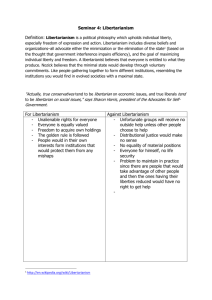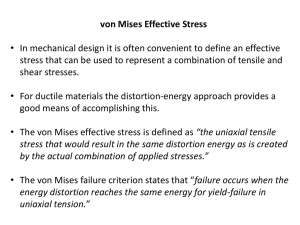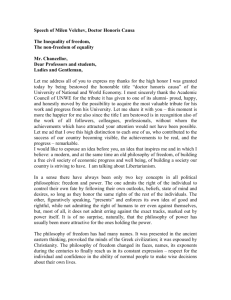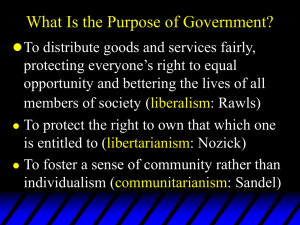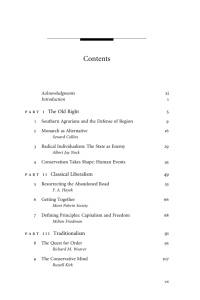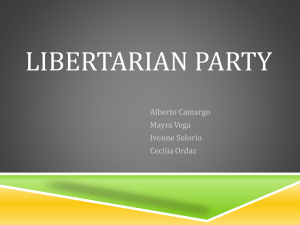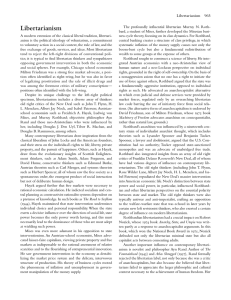Libertarianism 101 - DuPage Libertarians
advertisement
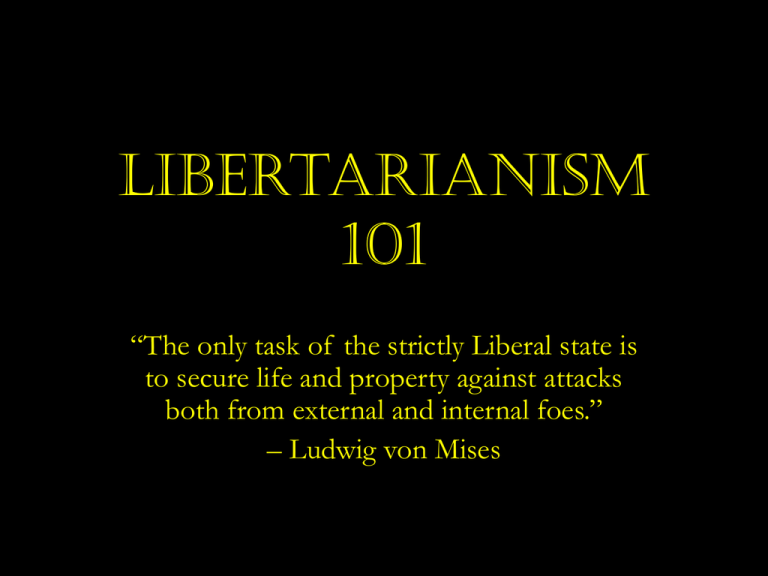
Libertarianism 101 “The only task of the strictly Liberal state is to secure life and property against attacks both from external and internal foes.” – Ludwig von Mises Definitions • "Libertarianism promotes a society where no one is the first to harm (strike, defraud, steal from) another. If someone fails to obey this oneand-only law, then he or she must make things right again with the one who is harmed. The only legitimate use of force is self-defense. Basically, libertarianism is a restatement of how we learned to get along with each other as youngsters. We honor our neighbors' choices, and they honor ours. We don't start fights and only fight back when attacked. We try to make right any wrongs that we do.” – Mary Ruwart • “The basic premise of libertarianism is that each individual should be free to do as he or she pleases so long as he or she does not harm others. In the libertarian view, societies and governments infringe on individual liberties whenever they tax wealth, create penalties for victimless crimes, or otherwise attempt to control or regulate individual conduct which harms or benefits no one except the individual who engages in it.“ – Definition by the Internal Revenue Service Economic Policy I. Libertarians are Laissez-Faire: – “Laissez faire does not mean: let soulless mechanical forces operate. It means: let individuals choose how they want to cooperate in the social division of labor and let them determine what the entrepreneurs should produce.” – Ludwig von Mises – “The market economy safeguards peaceful economic cooperation because it does not use force upon the economic plans of the citizens. If one masterplan is to be substituted for the plans of each citizen, endless fighting must emerge.” – Ludwig von Mises Economic Policy II. Libertarians are opposed to corporatism: – “Fascism should more appropriately be called Corporatism because it is a merger of state and corporate power.” – Benito Mussolini – “The Fascist conception of life stresses the importance of the State and accepts the individual only in so far as his interests coincide with the State. It is opposed to classical liberalism [which] denied the State in the name of the individual; Fascism reasserts the rights of the State as expressing the real essence of the individual.” – Benito Mussolini • “If the personal freedoms guaranteed by the Constitution inhibit the government's ability to govern the people, we should look to limit those guarantees.” – Bill Clinton – “When politicians control business, businessmen will control politics.” – Josh Hanson Economic Policy III. Libertarians understand that America is not “automatically” capitalist: – “[Mussolini] organized each trade or industrial group or professional group into a state-supervised trade association. He called it a corporative. These corporatives operated under state supervision and could plan production, quality, prices, distribution, labor standards, etc. The National Recovery Act provided that in America each industry should be organized into a federally supervised trade association. It was not called a corporative. It was called a Code Authority. But it was essentially the same thing. These code authorities could regulate production, quantities, qualities, prices, distribution methods, etc., under the supervision of the NRA. This was fascism.” – John T. Flynn, The Roosevelt Myth Social Policy I. Libertarians are socially tolerant: – “A free man must be able to endure it when his fellow men act and live otherwise than he considers proper. He must free himself from the habit, just as soon as something does not please him, of calling for the police.” – Ludwig von Mises – “But our rulers can have authority over such natural rights only as we have submitted to them. The rights of conscience we never submitted, we could not submit. We are answerable for them to our God. The legitimate powers of government extend to such acts only as are injurious to others. But it does me no injury for my neighbor to say there are twenty gods, or no God. It neither picks my pocket nor breaks my leg." – Thomas Jefferson Social Policy II. Libertarians are not libertines: – “The fact is that libertarianism is not and does not pretend to be a complete moral, or aesthetic theory; it is only a political theory, that is, the important subset. of moral theory that deals with the proper role of violence in social life. Political theory deals with what is proper or improper for government to do, and government is distinguished from every other group in society as being the institution of organized violence. Libertarianism holds that the only proper role of violence is to defend person and property against violence, that any use of violence that goes beyond such just defense is itself aggressive, unjust, and criminal. Libertarianism, therefore, is a theory which states that everyone should be free of violent invasion, should he free to do as he sees fit except invade the person or property of another. What a person does with his or her life is vital and important, but is simply irrelevant to libertarianism.” – Murray Rothbard Foreign Policy I. Libertarians are just as skeptical of the state’s actions abroad as they are of the state’s actions at home: – “Government should be restrained from intervening at home or abroad because its actions fail to achieve their stated aims, create more harm than good, shrink the liberty of the people, and violate rights.” – Lew Rockwell – “Once you hear it stated, it makes perfect sense that there is no sharp distinction between the principles of domestic and foreign policy. They are part of the same analytical fabric. What would be inconsistent would be to favor activist government at home but restraint abroad, or the reverse: restraint at home and activism abroad. Government unleashed behaves in its own interests, and will not restrict itself in any area of life. It must be curbed in all areas of life lest freedom suffer.” – Lew Rockwell Foreign Policy II. War is the health of the state: – “War has always been the occasion of a great – and usually permanent – acceleration and intensification of State power over society. War is the great excuse for mobilizing all the energies and resources of the nation, in the name of patriotic rhetoric, under the aegis and dictation of the State apparatus. It is in war that the State really comes into its own: swelling in power, in number, in pride, in absolute dominion over the economy and the society.” – Murray Rothbard – “Given that government is a catastrophe always and ever just waiting to explode, the last thing we want is for them to mix it up with each other. If we have to have institutions that are exercises in initiatory violence, and, it appears, we must, then at least let us all bend our efforts to keep them away from each other.” – Walter Block
